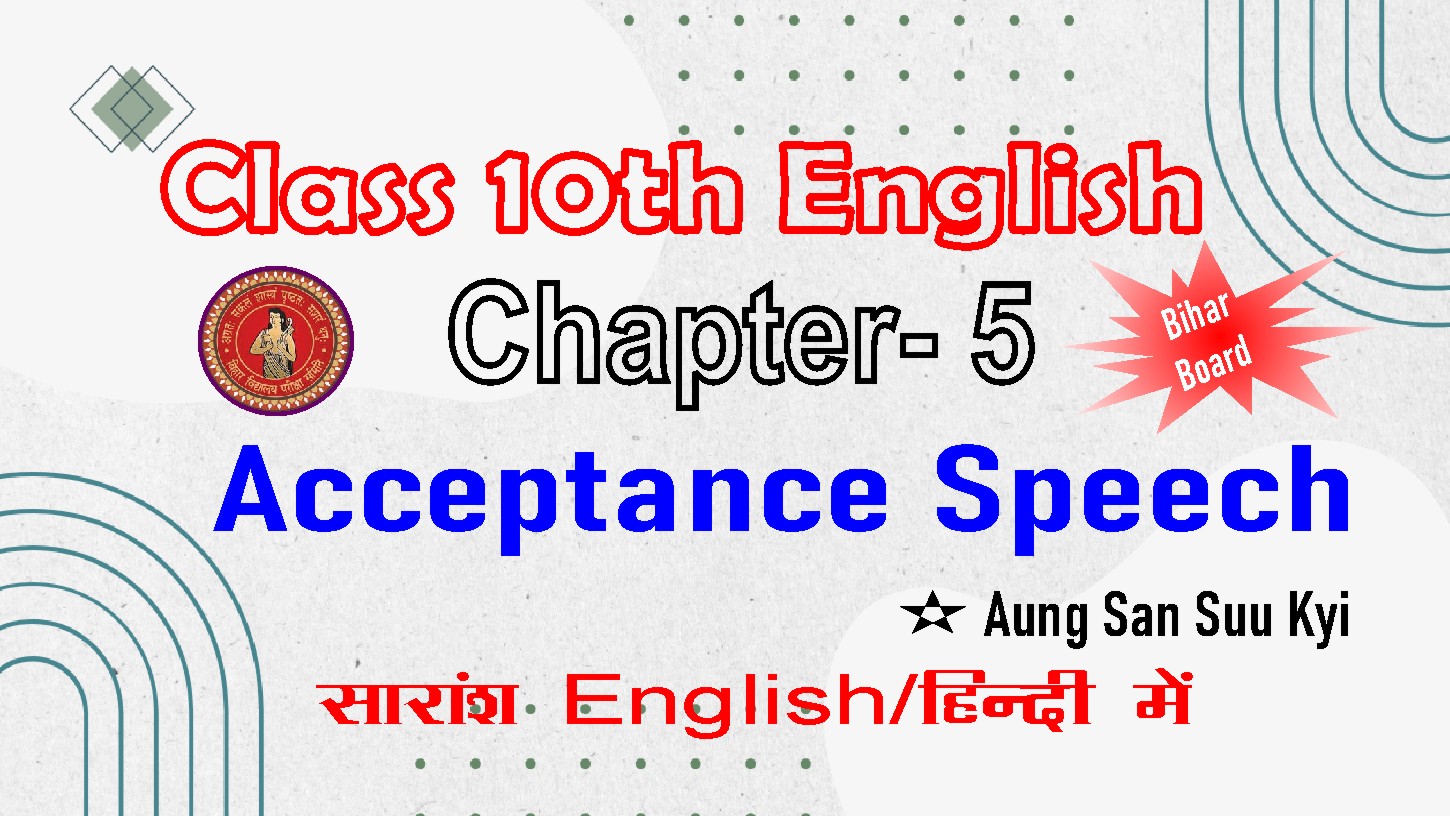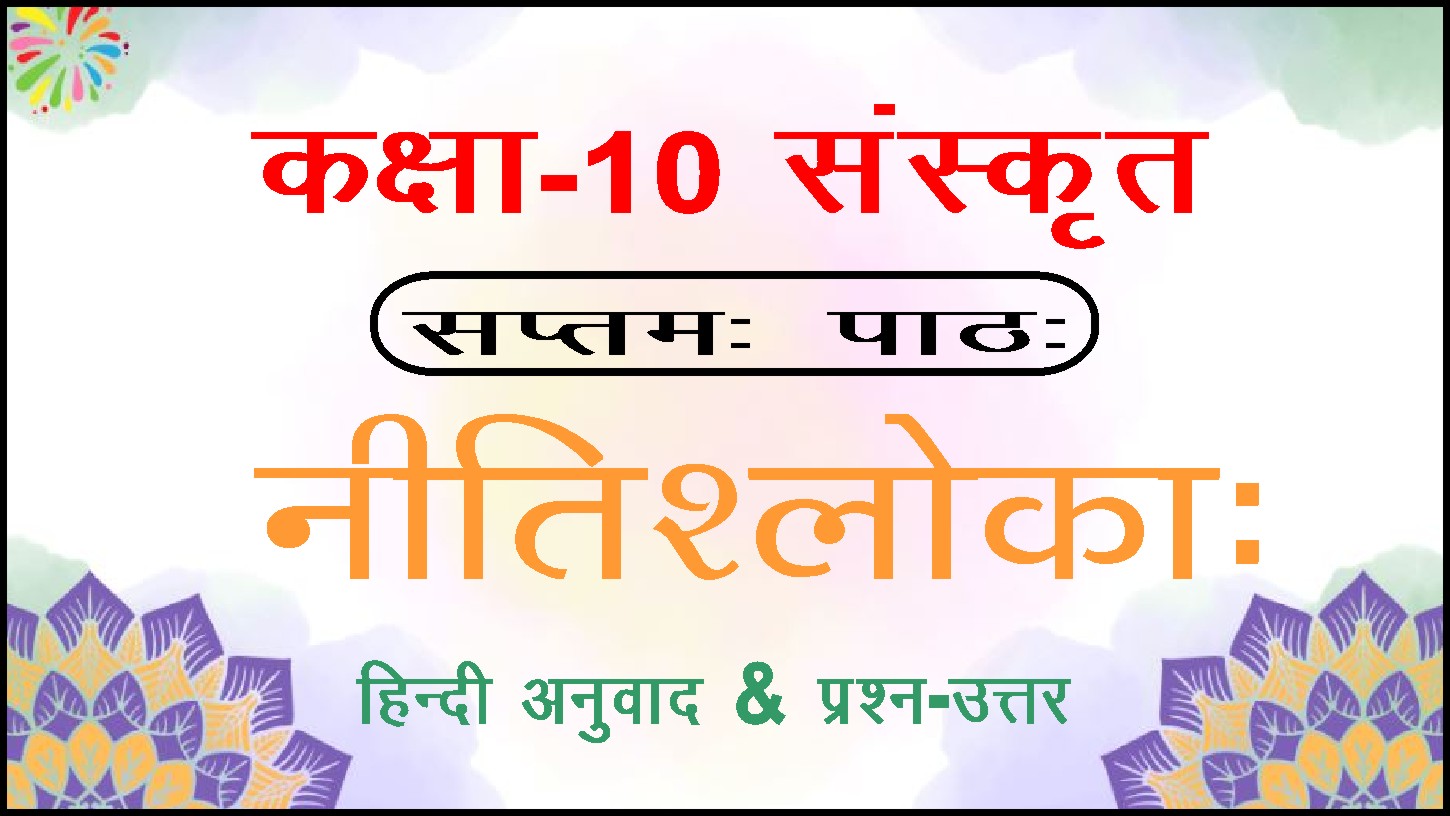Bihar Board Class 10 English Chapter 5: “Acceptance Speech” jo lekhika Aung San Suu Kyi ke dwara likhi gayi hai jiska summari hamne bahut hi asan bhasha me taiyar kiya hai ummid karta hu ki aapko ye bahut pasand aayegi. agar aap maths ki taiyari karna chahte hai to aap hamare Youtube Channel Unlock Study par jakar kar sakte hai.
Bihar Board Class 10 Chapter 5 Acceptance Speech Summary English And Hindi
Acceptance Speech – Summary
स्वीकृति भाषण – हिंदी सारांश
By: Aung San Suu Kyi
लेखिका: आंग सान सू की
Aung San Suu Kyi, the pro-democracy leader of Myanmar, delivered this acceptance speech in 2012 after being awarded the Nobel Peace Prize in 1991. She could not receive the prize earlier because she was under house arrest at the time due to her peaceful resistance against the military dictatorship in her country. This speech is a reflection on peace, human rights, compassion, and hope.
आंग सान सू की, म्यांमार (बर्मा) की लोकतंत्र समर्थक नेता हैं। उन्हें 1991 में नोबेल शांति पुरस्कार से सम्मानित किया गया था, लेकिन उस समय वे नज़रबंद थीं और पुरस्कार ग्रहण नहीं कर सकीं। उन्होंने यह भाषण 2012 में नार्वे के ओस्लो शहर में दिया। इस भाषण में उन्होंने शांति, मानवाधिकार, करुणा और आशा के विषय में अपने विचार साझा किए।
Peace and Human Rights
Aung San Suu Kyi begins her speech by explaining what peace truly means. To her, peace is not only the absence of war, but the presence of freedom from fear. She believes that peace and human rights are closely linked. Real peace is only possible when everyone’s basic rights—like freedom, justice, and equality—are respected. Without these, people live in fear, and that fear destroys the spirit of peace.
शांति और मानवाधिकार
सू की कहती हैं कि शांति का अर्थ केवल युद्ध न होना नहीं है, बल्कि इसका सच्चा अर्थ है भय से मुक्ति। जब तक लोगों को उनके मूल अधिकार—जैसे स्वतंत्रता, न्याय और सम्मान—नहीं मिलते, तब तक शांति अधूरी रहती है। वे कहती हैं कि शांति और मानवाधिकार एक-दूसरे से गहराई से जुड़े हैं। जहां डर और अन्याय है, वहां शांति नहीं हो सकती।
Her Experience of Isolation
She shares her personal experience of living in isolation during house arrest. For many years, she was cut off from the world—no radio, no newspapers, no visitors. This loneliness made her feel forgotten by the outside world. But when she received the Nobel Peace Prize, she felt connected again. It reminded her that she was not alone, and that her struggle had meaning. The award gave her strength and courage to keep fighting peacefully.
एकांत में बिताए दिन
वे अपने गृह-कारावास (हाउस अरेस्ट) के वर्षों की बात करती हैं। उन्हें कई सालों तक दुनिया से अलग कर दिया गया—न समाचारपत्र, न रेडियो, न किसी से मिलने की अनुमति। इस अकेलेपन में उन्हें लगता था कि दुनिया ने उन्हें भुला दिया है। लेकिन जब उन्हें नोबेल पुरस्कार की सूचना मिली, तो उन्हें लगा कि वे दुनिया से फिर से जुड़ गई हैं। इस पुरस्कार ने उन्हें आशा और हिम्मत दी कि उनका संघर्ष व्यर्थ नहीं है।
Global Responsibility and Compassion
Suu Kyi talks about global suffering and how people across the world must share in each other’s pain. Whether people are suffering in Myanmar, Africa, or anywhere else, she says that we are all responsible for each other. Those who enjoy peace and freedom should help those who are still oppressed. Compassion and solidarity, she says, are essential for peace. We must never ignore the pain of others.
वैश्विक जिम्मेदारी और करुणा
वे कहती हैं कि दुनिया में कहीं भी होने वाला दुख सार्वभौमिक होता है। चाहे वह म्यांमार में हो या किसी और देश में—हमें दूसरों के दर्द को महसूस करना चाहिए। जो लोग स्वतंत्रता और सुख में हैं, उन्हें उन लोगों की मदद करनी चाहिए जो संघर्ष में हैं। वे कहती हैं कि शांति की नींव करुणा और सहानुभूति में है। यदि हम दूसरों के दुख की अनदेखी करते हैं, तो हम भी हिंसा और अन्याय के भागीदार बनते हैं।
Faith in Humanity
Despite her long struggle, Suu Kyi expresses strong faith in the human spirit. She believes that people everywhere want peace, dignity, and justice. Even if governments fail, ordinary people can bring change through non-violence, truth, and courage. She emphasizes that hope and determination are powerful forces that can overcome even the darkest times.
मानवता में विश्वास
सू की कहती हैं कि उन्होंने अपने कठिन समय में भी मानवता पर विश्वास नहीं खोया। उन्हें भरोसा है कि लोग सच्चाई, अहिंसा और सम्मान को चाहते हैं। अगर आम लोग एकजुट हो जाएं, तो दुनिया में बड़ा परिवर्तन संभव है। वे बताती हैं कि आशा, साहस और संकल्प से कोई भी कठिनाई पार की जा सकती है।
Gratitude and Dedication
In the end, she expresses deep gratitude to the Nobel Committee and to all those who supported her and her people. She dedicates the prize to the people of Myanmar who have suffered and sacrificed in the fight for democracy and freedom. Her message is clear: peace is possible, and everyone must work together to achieve it.
कृतज्ञता और समर्पण
अंत में वे नोबेल समिति और अपने समर्थकों को धन्यवाद देती हैं। वे यह पुरस्कार म्यांमार के उन लाखों लोगों को समर्पित करती हैं जो लोकतंत्र और आज़ादी के लिए संघर्ष कर रहे हैं। उनका संदेश है—शांति संभव है, यदि हम सब मिलकर उसके लिए प्रयास करें।
Conclusion
Aung San Suu Kyi’s speech is a powerful reminder of the importance of peace, human rights, and compassion. Her words inspire people to fight peacefully for justice and to never give up hope, no matter how difficult the situation. The speech encourages us all to be kind, courageous, and committed to creating a better world.
निष्कर्ष
यह भाषण हमें सिखाता है कि शांति, अधिकार और करुणा के बिना दुनिया अधूरी है। आंग सान सू की का जीवन और उनका यह भाषण हमें साहस, सच्चाई और मानवता की राह पर चलने की प्रेरणा देता है।

















